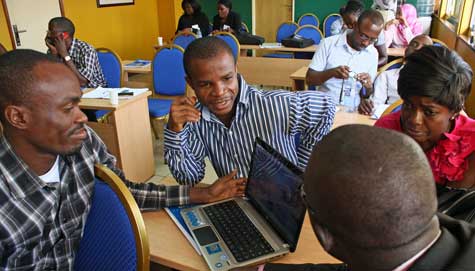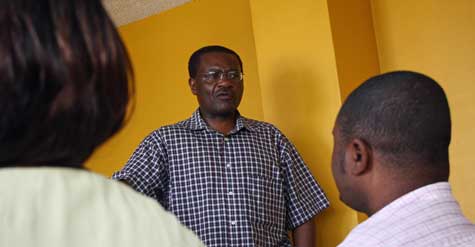Fighting Corruption in Africa
10-08-12
For one day, the newsletter reporter followed a Danida Fellowship Centre course, held at the International Law Institute in Kampala, with his pen and camera. See the pictures and read the words on how fellows from different African countries learn from each others’ experiences combating the evils of corruption.
Text and photos: Jan Kjær
“All these countries have legal frame work. Laws and policies are there. So what is the problem? Political will!”
Facilitator Dr. Twinomugisha is very direct. On 19th of June 2012 he was addressing the 24 participants from different African countries following ‘Promoting Government Integrity and Anti-Corruption’ course in Kampala.
Dr. Twinomugisha is a very experienced Ugandan lawyer in the human rights and anti-corruption field and he was able to chip in a lot of relevant information while presenting case stories of corruption in Ghana, Tanzania and Zambia. Group work and presentations by the participants were part of that day’s programme.
Laughter and fear
The level of interaction was very high and the participants asked a lot of questions. Laughter broke out from time to time when Dr. Twinomugisha cracked a joke, but he also raised eye brows when giving examples of corrupt practices in an African context. And the examples are many ranging from procurement of helicopters or radar systems to negotiating oil contracts.
Corruption is high in many countries, and so are the repercussions for some of the whistleblowers.
“In certain countries people whisper while discussing corruption. They fear for their lives,” Dr. Twinomugisha explained.
While discussing corruption he was constantly referring to the overall frame work: Aid dependency, World Bank/IMF and the world economic order.
Varied programme including visits
The day’s programme focused on the case stories from the three different African countries.
During different days other themes hosting various facilitators were discussed i.e. ‘Good governance and the Judiciary,’ ‘Taxonomy, Causes and Types of Corruption,’ ‘Promoting Integrity in Public Procurement,’ and ‘National, regional and International Interventions to Eradicate Corruption.’ The participants also had the possibility to visit the Anti-Corruption Court.
During the same two weeks in June, other participants followed a course in ‘Procurement’ at Uganda Management Institute, also in Kampala.
Yes, increasingly more DFC courses are held abroad. It is the new trend.
………………………………………………………………………
Sarah Bosompem, course participant and Assistant Economics Officer in the Ministry of Finance and Economic Planning, Ghana.
“Well, before I began here I had a very shallow knowledge of corruption and its impact on service delivery. I have been enlightened. It has broadened my scope when it comes to corruption and its impact.”
“When you go to the grassroots they are denied basic amenities such as education, water, and electricity. All because of corruption. Money supposed to be used for those purposes are channeled into other areas for personal gain.”
“I have no complaints about this course. It is an intensive course where we talk about so many things, so two weeks might not be enough.”
“It is also a nice experience for me to be here in Uganda learning about other people’s culture, norms, and most important political environment. In Ghana we have multiparty democracy. Here the president has managed to change the constitution to stand as many terms as he wants. That is not good. In Ghana, a president can stand twice and a maximum of 8 years.”
Joseph Tamukedde, course participant and Branch Accountant in the Ministry of Water and Environment, Uganda.
“This beautiful course is an eye opener for me. It gives me the knowledge on how to establish if there are any corrupt tendencies in any payment transaction. It has revealed both the causes and effects of corruption and provided me with the mitigation measures.”
“All this is wrapped up in good governance. If you have good governance then few corrupt practices will prevail, because everybody will know the roles.”
“The course has furthermore given me a specific tool: An action plan. This is my first time doing that. Before I have heard the name, but never put it into practise. I have really appreciated this feature.”
“It is great to be with other Africans from different countries. The case stories prove that we share the same challenges. I have seen how other countries cope with the challenges pertaining corruption, integrity and good governance. The comparison gives the base on how to approach these challenges.”
Neha Pandya, Director of Programmes and Special Projects at the International Law Institute, Kampala.
“All participants stay together during the two-week course, even the Ugandans. This makes it possible to develop networks that are not limited to the contents of the classroom. In this region the concept of a social and professional network is essential. The midlevel participants of this course will in 15 years be in senior positions at the highest level of decision making. Even ministers! Then they will be able to use the network they created here.”
“When they first came, the Ugandans group stayed together. So did the Zambians and Ghanaians. Now, after more than a week they are interrelating. A forum for dialogue is created in the classroom as well as outside.”
“When the International Law Institute of Washington started its branch in Kampala we brought in high level experts from the US. After 5-10 years we managed to get a good pool of Ugandans and other Africans facilitators, all highly educated with lots of international experience. In the evaluations of the courses they obtained the highest rankings by the participants. What they offer seems to be more contextualized, relevant and based on dialogue, rather than the wisdom of the West only.”
“The Danida Fellowship programmes are some of my favorites that we run here at the International Law Institute. Danida requires course developers and managers. All is thought through comprehensively. There is time for developing the courses and time for follow up.”
“What is exiting about Danida is that they really treat us as equal partners. They give is the space to develop according to our experiences from the region.”
………………………………………………………………………
DFC Courses in Africa
Danida Fellowship Centre is to a larger extent making use of training institutes in its partner countries in the developing world instead of inviting all fellows to Denmark. This trend began in 2009, when DFC decided to branch out its capacity development support to take place in developing countries, aligning more closely to the capacity needs and capacity development policies of the countries.
Courses were originally transferred to Africa due to the focus of Danish development assistance. However, participants will also be invited from other parts of the world. Courses in Asia are also in the pipeline.
DFC has been looking for opportunities to support training institutions, which are running or can run courses in one or more of these areas:
1. Public sector management and international cooperation.
2. Good governance, democracy, human rights
3. Mainstreaming issues such as gender and environment.
4. Sector specific courses which – according to Danish priorities in development cooperation – could be within the fields of: agriculture, health, environment, private sector, climate change, disaster risk reduction, etc.
Here are our African partners
At present DFC co-operates with the following institutions in its partner countries:
- Strathmore University (Kenya) – www.strathmore.edu
- Uganda Management Institute (UMI) – www.umi.ac.ug
- International Law Institute – African Centre for Legal Excellence (ILI-ACLE) (Uganda) – www.iliacle.org
- Ghana Institute of Management and Public Administration (GIMPA) – http://www.gimpa.edu.gh/
- Eastern and Southern African Management Institute (ESAMI) (Tanzania, Zambia og Mozambique) – www.esami-africa.org
- Ecole Nationale d’Adminstration et de Magisstrature (ENAM) (Benin) – www.enam.bj.refer.org
- l’Institut International d’Ingénierie de l’Eau et de l’Environnement (2IE) de Ouagadougou (Burkina Faso) – www.2ie-edu.org
- Initiatives Conseil International (ICI) (Burkina Faso)
- Universidade Eduardo Mondlane (UEM) (Mozambique)
- Agrhymet (Niger)
Read more about the DFC courses in the developing countries here
For more information, please contact training adviser Lars Pedersen at lp@dfcentre.dk.
Go back to our stories

